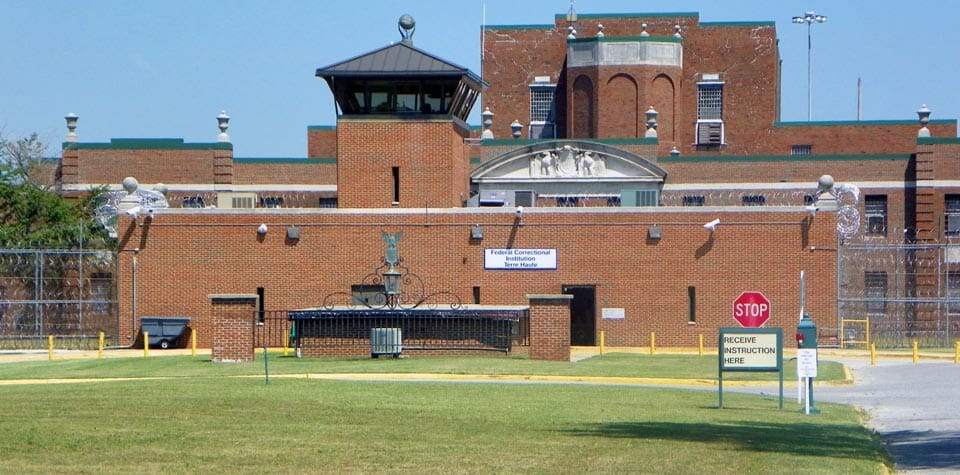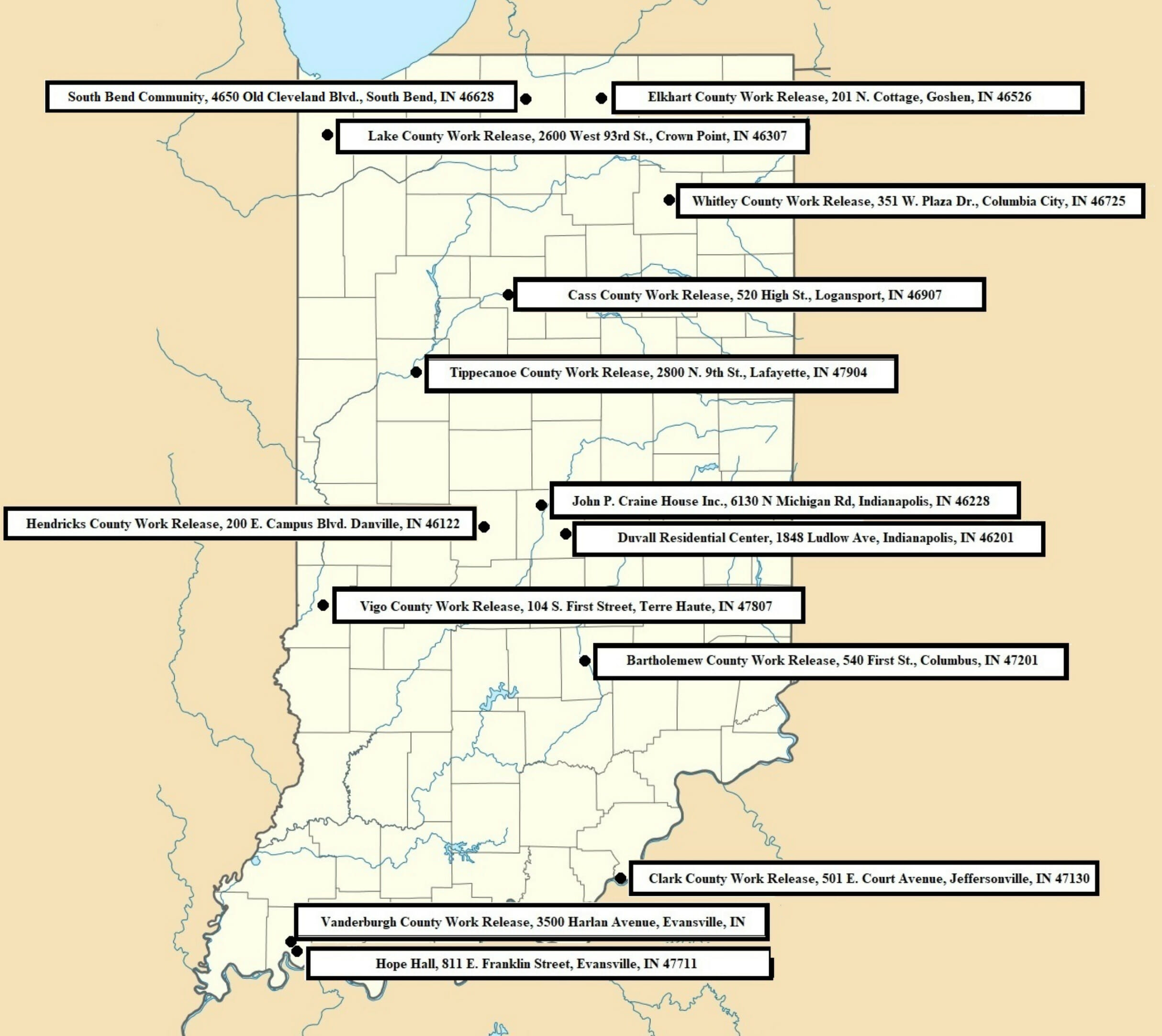
Criminal Justice in Indiana
Indiana manages most of the criminal justice institutions within its borders. The following sections outline key data points that summarize the scope of crime, incarceration, and rehabilitation in Indiana.
Indiana Prison Population Statistics
The quickest way to ascertain the scope of a state’s criminal justice program is to answer these two questions:
- How many people are incarcerated in Indiana?
- What are the biggest prisons in Indiana?

According to the Bureau of Justice Statistics, Indiana has the 19th highest incarceration rate in the U.S., ahead of Tennessee but behind Nevada. While Indiana’s jail population has begun to level off and even decline in recent years, the state’s prison population is still quite high. This suggests more offenders are being sentenced to long prison sentences rather than being held in jail for shorter sentences or released altogether. For the numbers, Indiana has an incarceration rate of 399 per 100,000, a violent crime rate of 371, and a property crime rate of 1,971. The state spends about $20,086 per inmate per year.1
The National Institute of Corrections reports that Indiana has 92 jails across 92 counties, with a jail population of 20,880.2 That same institute reports Indiana has 18 state prisons and a prison population of 27,180. The state also has 111,581 individuals under probation and 6,040 under parole. Indiana employs some 6,473 people in its prison facilities, and its Corrections Department has an annual budget of $547,892,199, the seventh costliest item in the state’s budget.3

Indiana has one federal prison, the Federal Correctional Institution, Terre Haute, with a population of 1,190 inmates. Further, about 16% of Indiana’s incarcerated individuals are held in private prisons. The Miami Correctional Facility, located in Bunker Hill, Indiana, is the largest prison in the state, with a capacity of 3,188.4
Indiana Crime Statistics and Recidivism Data
Indiana reports its crime rates, data that federal organizations analyze and publish. According to the Bureau of Justice Assistance, Indiana reports between 20,000 and 25,000 violent crimes per year, including 300 to 400 murders, 1,500 to 3,000 rapes, 6,000 to 7,000 robberies, and 13,000 to 14,000 aggravated assaults. Indiana also reports about 180,000 to 200,000 property crimes. Law enforcement officers in Indiana perform about 130,000 arrests in the state each year.5
Beyond examining crime rates, perhaps the best way to measure the overall efficacy of Indiana’s criminal justice system is to examine the state’s recidivism. Recidivism rates in Indiana do tend to fluctuate, but usually within a somewhat predictable range. According to the Bureau of Justice Assistance, Indiana has a recidivism rate of 37%, meaning Indiana’s criminal justice system is not working for at least one out of every three individuals who go through it.
The state of Indiana also publishes information on recidivism. According to the Indiana Department of Corrections, the state reports a recidivism rate between 33% and 40%. The state data also mentions that the younger the offender, the more likely they will re-offend and end up incarcerated again. Such insights press upon the need for alternatives to incarceration, especially for nonviolent offenders and young offenders.6
Prisoners in Indiana who receive visits from family or friends while incarcerated are 15% less likely to re-offend, suggesting Indiana prisons should do everything they can to reduce barriers to family visits and to encourage such visits. Further, prisoners participating in work-release programs are 37% less likely to re-offend, indicating that such programs should be made available and strongly encouraged for all inmates.
Criminal Rehabilitation in Indiana
Criminal reform in Indiana and the programs utilized to create such reform is the most important factors in determining whether or not inmates will go on to lead crime-free lives post-incarceration. Indiana has several rehabilitation programs that help inmates, some organized by the state and others by nonprofits or faith organizations within the state. Examples of such programs include:
- Work-Release programs run by Indiana7
- Prisoner and Community Together (PACT)8
- Public Advocates in Community Re-Entry (PACE)9
- The Indiana Department of Correction (IDOC) Addiction Recovery Services Division10

Unfortunately, Indiana also gets some things wrong in its approach to criminal rehabilitation. For example, Indiana is one of 27 U.S. states still practicing the death penalty.11
Alternatives to Incarceration in Indiana
Alternatives to incarceration in Indiana should include programs that help offenders reform but that do so without introducing the offender to the prison system. Serving time in prison has many negative effects, so alternatives to prison in Indiana should be pursued, especially for nonviolent offenders.
The Indiana criminal justice system offers some alternatives to incarceration, though these should be expanded. For example, Vigo County, a mostly rural county in Indiana, made headlines when it became the first county in the state to shift from incarcerating Indianans for marijuana possession to simply having law enforcement officers write citations for people found in possession of marijuana.12
By implementing more educational programs inside prisons in Indiana and by updating and improving rehabilitation programs inside prisons in Indiana, offenders can finally experience real reform that helps them become responsible, contributing members of society again.
Sources:
- BJS. “Prisoners in 2020 – Statistical Tables.” Bureau of Justice Statistics, 2020. bjs.ojp.gov
- NIC. “Indiana 2019.” National Institute of Corrections, 2019. nicic.gov
- Urban. “Project Indiana.” Urban Institute, 2022. urban.org
- IDC. “Miami Correctional Facility.” Indiana Department of Correction, 2022. in.gov
- BJA. “State Criminal Justice Profile, Indiana.” Bureau of Justice Assistance, 2014. bjafactsheets.iir.com
- IDC. “Indiana Department of Correction, 2019 Adult Recidivism Rates.” Indiana Department of Correction, 2020. in.gov
- IDC. “Work Release Centers.” Indiana Department of Correction, 2022. in.gov
- PACT. “PACT Changes Lives.” PACT, 2022. pactchangeslives.com/
- PACE. “PACE.” Public Advocates for Community Re-Entry, 2022. paceindy.org/
- IDC. “Addiction Recovery.” Indiana Department of Correction, 2022. in.gov
- IDC. “History of Capital Punishment in Indiana.” Indiana Department of Correction, 2022. in.gov
- Tristar. “Alternatives to incarceration: Community working to keep more people out of jail.” Tribune-Star, 2022. tribstar.com
Related Articles
How States are Grappling with Young People Who Commit Crimes
According to the Office of Juvenile Justice and Delinquency Prevention, the U.S. recorded 424,300 arrests of persons under 18 in 2020. Of those crimes, 930...
Read more >>
Kentucky Is the Latest State to Adopt Rehabilitation Over Incarceration for Nonviolent Drug Offenders
Several states across the country have been revisiting certain laws enacted during the War on Drugs era, laws that resulted in harsh sentences for people...
Read more >>
What Is the Scope of Private Prisons in the U.S.?
In 2001, the Federal Bureau of Justice Assistance authored a report analyzing then-emergent issues regarding private prisons in the United States. According to the authors...
Read more >>
I Finally Found Someone I Could Help
Conditions of Life Course Success The Conditions of Life Course made me go beyond the surface to find answers to questions using events in my...
Read more >>





